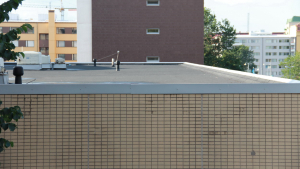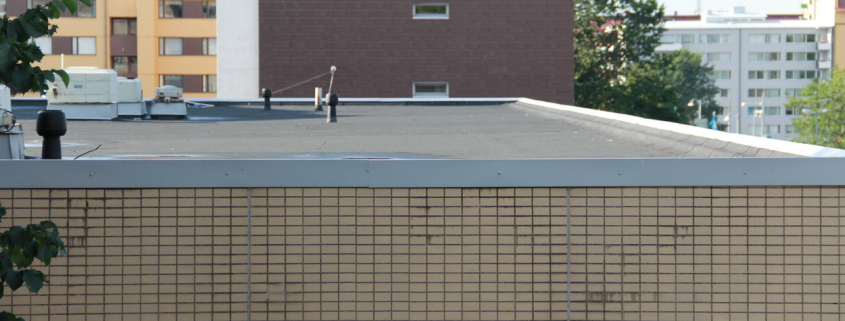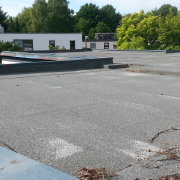Cold Applied Modified Bitumen Roofing
Cold Applied Modified Bitumen Roofing
There are different materials which can be used on commercial buildings. One of the popular choices in commercial roofing is the use of cold applied modified bitumen roofing. This material was first introduced and used in Europe in the 1960s and was later brought to America in the 1970s. For the past decades, bitumen roofing has grown more and more popular and is now a top choice for flat and low-sloped roofing commonly on commercial properties.

What is Modified Bitumen?
Modified bitumen roofing is made of polymer modified bitumen which is further reinforced with one or multiple layers of fabric which could be a material such as polyester, glass fiber, or even a combination of both of these materials. This type of roofing can be installed on a property through conventional methods or it can also be self-adhered to the underlying structure.
For property owners, there are mainly two types of modified bitumen membranes to choose from.
Atactic Polypropylene (APP)
APP is a modified bitumen roof which consists of a thermoplastic polymer. This can either be heat-welded or can also be torch-applied. The end result of this type of roofing gives asphalt a plastic-like finish.
Styrene Butadiene Styrene (SBS)
SBS bitumen roofing is a modified bitumen roof type that is installed with the use of cold adhesives or hot moppings of asphalt. This type of roofing can also come with some form of adhesive backing. The end result for this type of roofing is more rubber-like in quality.
Modified bitumen is a material that is made in manufacturing factories and is sold in sheets. The material has a consistent thickness. Bitumen roofing membranes can have 1 or even multiple bitumen sheets and also make use of a roofing felts along with those sheets.
Cold applied modified bitumen roofing membranes are not a new addition to the roofing industry. This method of application has been in use for quite a while and is becoming more and more favored due to the various benefits it provides. One of the advantages of this type of roofing is that it does not require the use of fire for installation, making it a much safer and easier method to use.
For cold applied bitumen roofing, the use of solvent-based membrane adhesives was one of the first methods of cold applications. Recently, there have been newer and more effective self-adhered systems that can achieve full bond strength. This allows roofers to enjoy time and labor-savings in any season.
Why Choose Bitumen Roofing?
The use of modified bitumen roofs is recommended for commercial roofing because of its longevity, strength, waterproof properties, and energy efficiency.
A modified bitumen roof can typically last up to 2 decades with minimal need for maintenance and repairs. During this time, bitumen roofs are able to stand against hot or cold weather conditions, especially when the roof has been reinforced with multiple layers of bitumen sheets. Aside from longevity and strength, bitumen roofs are also waterproof. The adhesives used to attach modified bitumen provide protection against water damage. Furthermore, modified bitumen roofs have been found to be energy efficient, providing an added insulation layer that keeps heat both inside and out of your property.
Modified bitumen membranes can offer exceptional weatherproofing protection, but only proper application will ensure longevity. In order to avoid any issues in terms of installation, it is best to seek the expertise of a licensed roofing contractor and work only with the right team.
It is essential that your roofer knows how to follow manufacturer recommendations and guidelines on installation, especially in terms of application temperatures and ambient conditions.
While bitumen roofs are a low maintenance roofing option, it is still necessary to get regular roof inspections and work on any maintenance and repairs as soon as possible to avoid further property damage and to also avoid higher costs in the future. While property owners or even your maintenance staff can do these checks, getting the help of roofing contractors who can spot minor problems and early signs of damage would benefit you in the long term.
The use of Waddle Exterior’s services will also eliminate the risks of injury during the process. Keeping any inexperience or untrained individuals safe. This will also allow a specialist to inspect, assess, and evaluate the entire roof system, whether modified bitumen or other type of roofing material, for concerns or issues that may or may not be immediately apparent.







